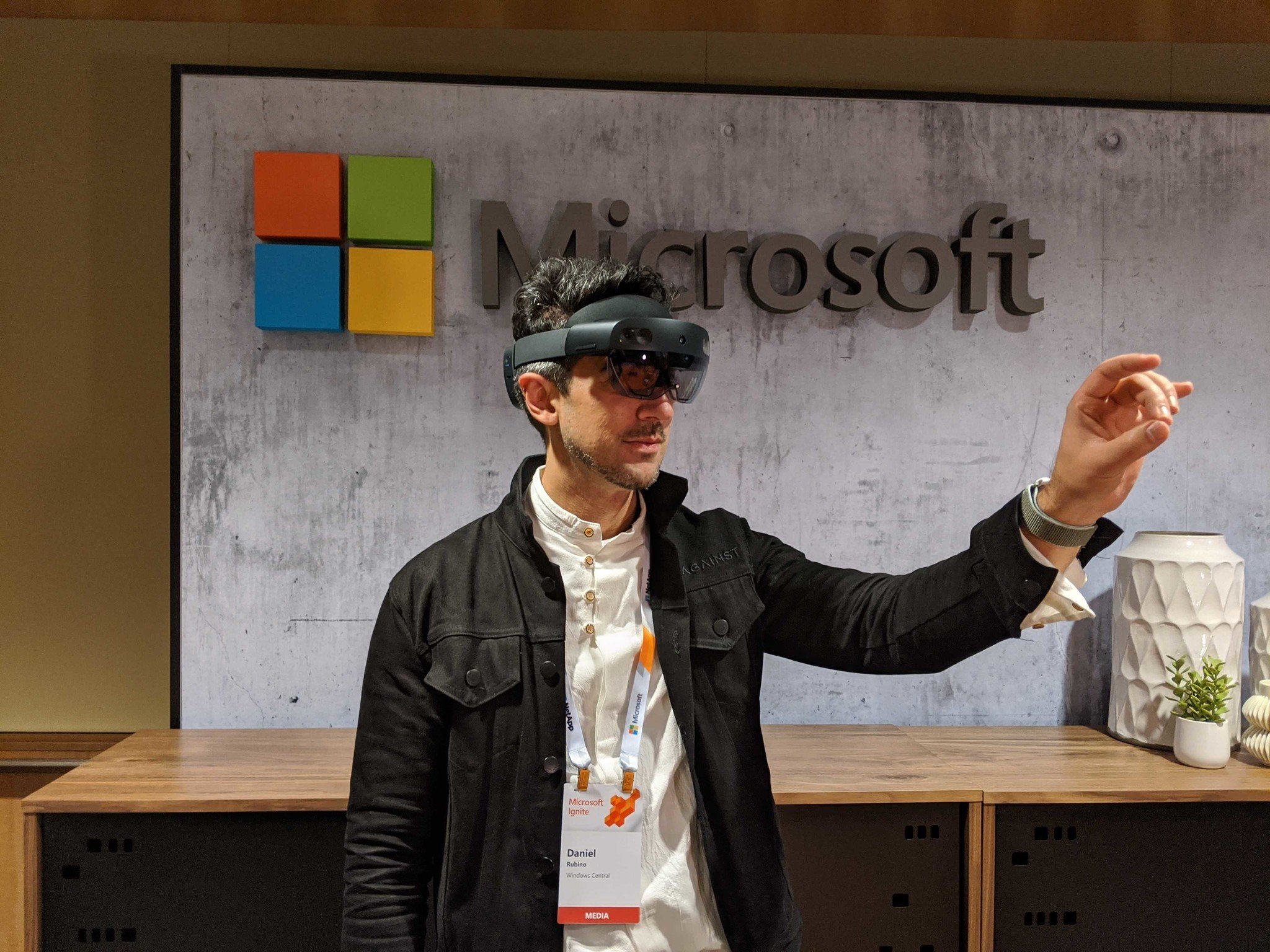Microsoft's HoloLens 3 's--t show' proves it still doesn't understand the consumer market
 Source: Windows Cardinal
Source: Windows Cardinal
Update eleven AM ET two/4/2022: Microsoft'south Alex Kipman has since posted a response claiming HoloLens 3 is non dead but did not address any of the other claims from the BI article.
Update 11 PM ET 2/4/2022: Business Insider has a new report that refutes Kipman, says HoloLens 3 is dead.
An explosive new written report from Business Insider confirms anybody's worst fearfulness regarding HoloLens and Mixed Reality: Microsoft has no idea what information technology's doing.
The story, which relied on reports from "more than 20 electric current and one-time employees," is a damming expose on the HoloLens sectionalization, headed by Microsoft technical fellow Alex Kipman. The entire program is patently in consummate disarray.
The news is devastating for those who thought that with HoloLens, announced in 2022, Microsoft would have an enormous advantage in the market because information technology was so early and ahead of everyone else.
In case yous missed it, hither is a tl;dr of Ashley Stewart's excellent reporting:
- HoloLens 3 was reportedly canceled in mid-2021.
- That timing was around when Microsoft partnered with Samsung for a mixed reality device.
- The pick to rely on Samsung for hardware while Microsoft focuses on software is causing disruption.
- The mixed reality and HoloLens teams are infighting over strategy: consumers vs. enterprise (and military).
- The leadership team has largely failed to address the concerns of employees working on these projects.
- The $22 billion Integrated Visual Augmentation Organisation (IVAS) for the Usa military is having major quality problems and is behind schedule.
- At to the lowest degree 25 Microsoft mixed reality employees left Microsoft and joined Facebook's Meta in 2022, but it may exist more than 100 employees.
It's no wonder why one Microsoft employee called it a "s--t testify." I have never heard of such a partition in this much chaos in all my years of covering Microsoft.
History repeats itself
 Microsoft Kinect well-nigh sunk all of Xbox. Source: Windows Central
Microsoft Kinect well-nigh sunk all of Xbox. Source: Windows Central
What'south so troubling about all this negative news regarding Windows Mixed Reality is how familiar it all is to those who follow Microsoft. The company has a terrible rail record of shipping consumer devices and creating new categories. There's Windows Phone, of class, but likewise Zune, the Courier Projection, Surface Neo, Windows 10X, Projection Andromeda, Kinect, Ring, Kin, the unabridged Nokia conquering, and some would lump in Surface Duo.
Even Windows Mixed Reality (WMR) has been in doubt despite being years ahead of anyone else, shipping free with all Windows 10 PCs, and having strong OEM support (HP, Lenovo, Acer, Samsung, and Dell all had WMR headsets).
 This seems like a slam douse of an thought, only it never happened. Source: Microsoft
This seems like a slam douse of an thought, only it never happened. Source: Microsoft
On the opposite, Microsoft's Xbox division, save for a few shaky years, has been nailing information technology, which explains why it is pivoting (and investing) so heavily into it. And Surface, for the almost office, has had strong (and innovative) releases that accept seen many iterations.
Only when information technology comes to cut-edge, generation-defying products, Microsoft is very good at envisioning them only rarely sticks the landing. And the cause of the failure? It's rarely due to the product beingness awful. Instead, it's almost always attributable to lousy leadership, tumultuous strategy, lack of direction, and an disability to empathise the market. I mean, we are talking about the same visitor that released its Kin phones at the same time it was selling Windows Mobile.
Interestingly, some in Microsoft's mixed reality division seem to know this past. The Samsung deal, which we speculated on the podcast, would take Microsoft do the software while Samsung did the hardware. Information technology makes sense, as Samsung can not only ship things on a global level, just it too makes processors, RAM, storage, displays, and headphones all internally. Samsung does hardware very well. (Since this editorial went alive, a new written report sheds more than calorie-free on the Samsung deal).
But, ironically, this decision to partner with Samsung is itself causing infighting within the mixed reality division. As reported by Business organisation Insider:
It was fifty-fifty suggested past some that Microsoft should end the Samsung partnership, or practise the bare minimum to fulfill information technology, in social club to focus on its own projects, the employee said.
Microsoft fifty-fifty hired Apple tree'due south vice president of engineering, who helped spearhead the iPad and iPhone. He wanted to get to the market ahead of Apple with a mixed reality headset for consumers. Of class, which is information technology? Is Microsoft doing its own consumer mixed reality headset, or is it Samsung? No ane seems to know.
The metaverse is still a joke
 Microsoft Mesh for Teams announced in 2022. Source: Microsoft
Microsoft Mesh for Teams announced in 2022. Source: Microsoft
All these issues circle back to the master problem, which is that virtual reality (VR), mixed reality (MR), and augmented reality (AR) are still all cool ideas with lilliputian utility for regular people. That may change, simply no one has been able to crack that nut then far. VR is all the same primarily for gamers with social sprinkled in, simply it has a long way to become before existence mainstream (if ever).
The recent trend of using "metaverse" as a buzzword for this technology is tragically hilarious. No one knows what it means. When examples are given, it refers to virtual reality … with avatars and a marketplace. Yeah, it's Second Life (2003), reborn but now with NFTs, virtual real manor, crypto, and idiotic venture capitalists. We become information technology. It'due south non cool.
Microsoft is caught upwardly in this hype, too, even using the phrase when information technology talked about its contempo declaration around the Activision Blizzard acquisition.
But if you have no idea what the metaverse is, neither does Microsoft. Even the teams working on information technology don't know what it is supposed to be and how to address it. The question is, will Apple? The company is rumored to release something in late 2022. If I were a betting human, I'd bet Cupertino is going to swoop in and boss this market, followed by Google (who has its own rocky past in this segment). Microsoft mixed reality could be Windows Mobile all over again.
Fourth dimension volition tell what will become of Microsoft's mixed reality ambitions. Unless it gets dorsum on track shortly, trades in leadership, and brings on a visionary who can execute, this could all go down in another all-likewise-long list of Microsoft's "nosotros were so far ahead we blew it" catastrophes.

Updated February 2022
Windows 11 review: The start of a new era
Microsoft is back with a roaring passion to create a modernistic version of the Windows user experience that's elementary to use, beautifully designed, and well-connected, all in an effort to make yous more productive in your professional person or creative workflows. But, is it whatsoever good?

Shooty bang bang
Where are all the guns in Dying Lite 2?
It'southward by pattern, sure, but at that place's a distinct lack of firearms in Dying Light 2. For amend or worse, modern medieval Villedor is a place to build your ain weapons. Just what happened to the guns and ammo and might information technology ever make a comeback?
Source: https://www.windowscentral.com/microsoft-apparently-has-no-idea-what-do-hololens
Posted by: cunninghamgiceit.blogspot.com


0 Response to "Microsoft's HoloLens 3 's--t show' proves it still doesn't understand the consumer market"
Post a Comment